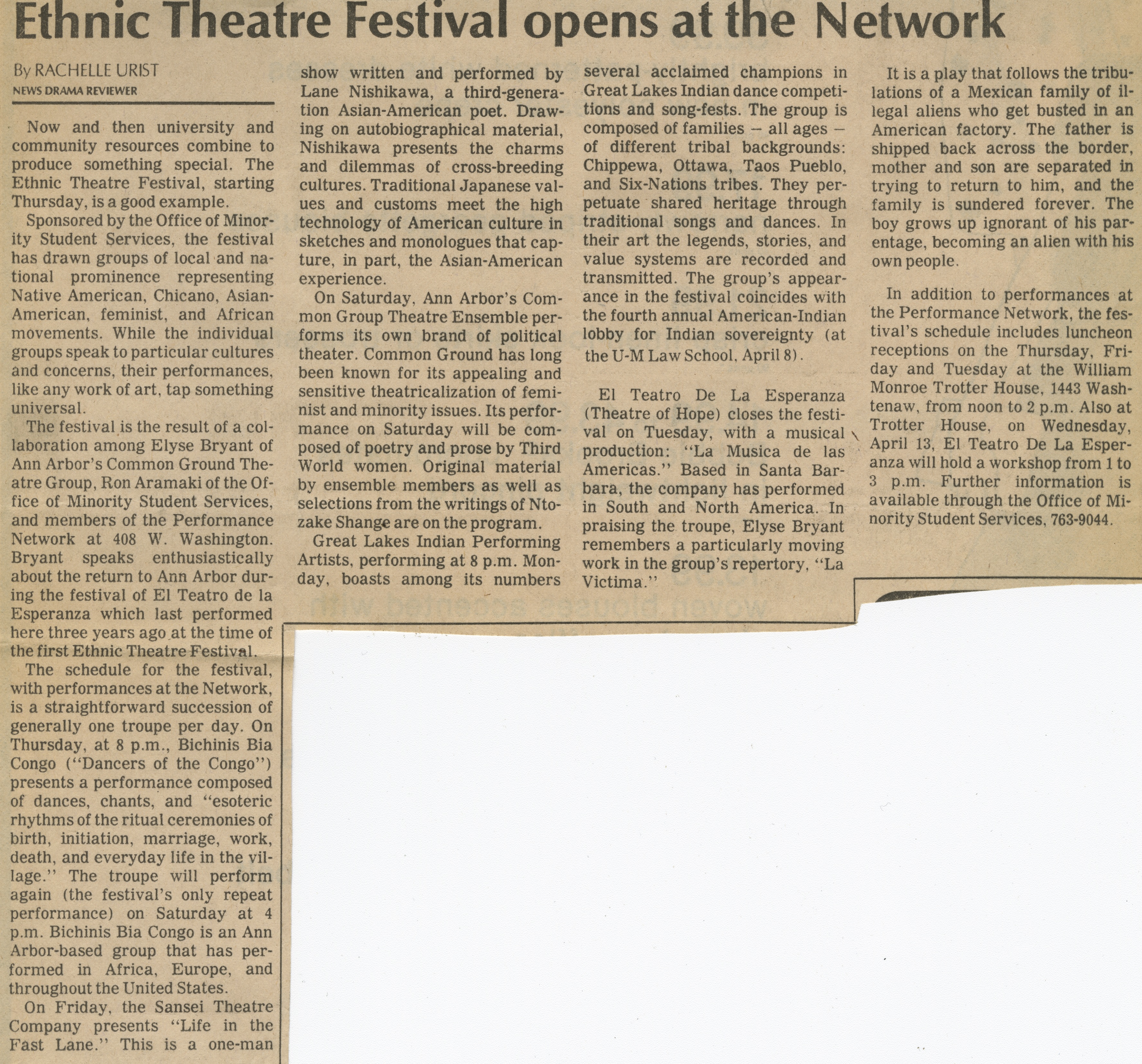Ethnic Theatre Festival opens at the Network

Ethnic Theatre Festival opens at the Network
By RACHELLE URIST
NEWS DRAMA REVIEWER
Now and then university and community resources combine to produce something special. The Ethnic Theatre Festival, starting Thursday, is a good example.
Sponsored by the Office of Minority Student Services, the festival has drawn groups of local and national prominence representing Native American, Chicano, Asian-American, feminist, and African movements. While the individual groups speak to particular cultures and concerns, their performances, like any work of art. tap something universal.
The festival is the result of a collaboration among Elyse Bryant of Ann Arbor’s Common Ground Theatre Group, Ron Aramaki of the Office of Minority Student Services, and members of the Performance Network at 408 W. Washington. Bryant speaks enthusiastically about the return to Ann Arbor during the festival of El Teatro de la Esperanza which last performed here three years ago at the time of the first Ethnic Theatre Festival.
The schedule for the festival, with performances at the Network, is a straightforward succession of generally one troupe per day. On Thursday, at 8 p.m., Bichinis Bia Congo (“Dancers of the Congo”) presents a performance composed of dances, chants, and “esoteric rhythms of the ritual ceremonies of birth, initiation, marriage, work, death, and everyday life in the village.” The troupe will perform again (the festival’s only repeat performance) on Saturday at 4 p.m. Bichinis Bia Congo is an Ann Arbor-based group that has performed in Africa, Europe, and throughout the United States.
On Friday, the Sansei Theatre Company presents “Life in the Fast Lane.” This is a one-man show written and performed by Lane Nishikawa, a third-generation Asian-American poet. Drawing on autobiographical material, Nishikawa presents the charms and dilemmas of cross-breeding cultures. Traditional Japanese values and customs meet the high technology of American culture in sketches and monologues that capture, in part, the Asian-American experience.
On Saturday. Ann Arbor's Common Group Theatre Ensemble performs its own brand of political theater. Common Ground has long been known for its appealing and sensitive theatricalization of feminist and minority issues. Its performance on Saturday will be composed of poetry and prose by Third World women. Original material by ensemble members as well as selections from the writings of Nto-zake Shange are on the program.
Great Lakes Indian Performing Artists, performing at 8 p.m. Monday, boasts among its numbers several acclaimed champions in Great Lakes Indian dance competitions and song-fests. The group is composed of families - all ages -of different tribal backgrounds: Chippewa, Ottawa, Taos Pueblo, and Six-Nations tribes. They perpetuate shared heritage through traditional songs and dances. In their art the legends, stories, and value systems are recorded and transmitted. The group’s appearance in the festival coincides with the fourth annual American-Indian lobby for Indian sovereignty (at the U-M Law School. April 8)
El Teatro De La Esperanza (Theatre of Hope) closes the festival on Tuesday, with a musical \ production: “La Musica de las Americas.” Based in Santa Barbara, the company has performed in South and North America. In praising the troupe, Elyse Bryant remembers a particularly moving work in the group’s repertory. "La Victima.”
It is a play that follows the tribulations of a Mexican family of illegal aliens who get busted in an American factory. The father is shipped back across the border, mother and son are separated in trying to return to him, and the family is sundered forever. The boy grows up ignorant of his parentage, becoming an alien with his own people.
In addition to performances at the Performance Network, the festival’s schedule includes luncheon receptions on the Thursday, Friday and Tuesday at the William Monroe Trotter House, 1443 Washtenaw. from noon to 2 p.m. Also at Trotter House, on Wednesday, April 13, El Teatro De La Esperanza will hold a workshop from 1 to 3 p.m. Further information is available through the Office of Minority Student Services, 763-9044.
Article
Subjects
Rachelle Urist
Performance Network
Ethnic Theatre Festival
University of Michigan - Office of Minority Student Services
Common Ground Theatre Ensemble
Bichinis Bia Congo
Life in the Fast Lane
Sansei Theatre Company
Great Lakes Indian Performing Artists
El Teatro De La Esperanza
Old News
Ann Arbor News
Elyse Bryant
Ron Aramaki
Lane Nishikawa
408 W Washington